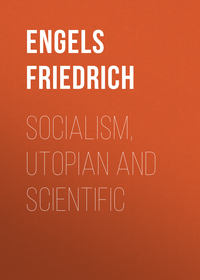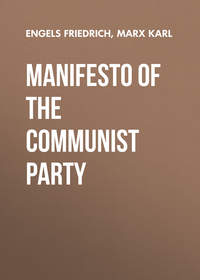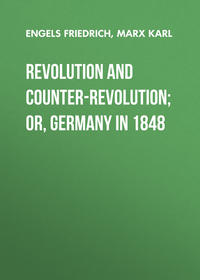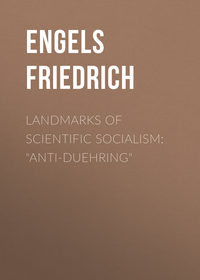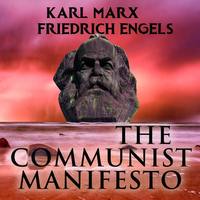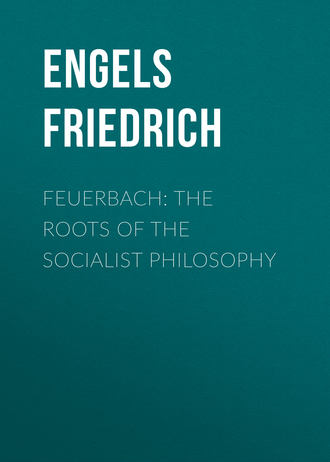 полная версия
полная версияFeuerbach: The roots of the socialist philosophy
The failure to exterminate the protestant heresy corresponded with the invincibility of the rising power of the bourgeois of that time; as this power grew, the fight with the feudal nobles, at first pre-eminently local, began to assume national proportions. The first great conflict occurred in Germany, the so-called Reformation. The power of the bourgeois was neither sufficiently strong nor sufficiently developed for an open rebellious stand, by uniting under the standard of revolt the city plebeians, the smaller nobility, and the peasants of the country districts. The nobility was struck first, the peasants took up a position which was the high-water mark of the entire revolution, the cities left them in the lurch, and so the revolution was left to the leaders of the country gentry who gathered the whole victory to themselves. Thenceforth for three hundred years Germany disappeared from the ranks of independent, energetic progressive countries. But after the German Luther, arose the French Calvin. With natural French acuteness he showed the bourgeois character of the revolution in the Church, republicanised and democratised. While the Lutheran Reformation fell in Germany and Germany declined, the Calvinistic served as a standard to the republicans in Geneva, in Holland, in Scotland, freed Holland from German and Spanish domination, and gave an ideological dress to the second act of the bourgeois revolution which proceeded in England. Here Calvinism proved itself to be the natural religious garb of the interests of the existing rule of the bourgeois and was not realised any further than that the revolution of 1689 was completed by a compromise between a portion of the nobility and the middle-class. The English Established Church was restored, but not in its earlier form with the king for Pope, but was strongly infused with Calvinism. The old-established Church had kept up the merry Catholic Sunday and fought against the tedious Calvinistic one, the new bourgeois Church introduced the latter and added thereby to the charms of England.
In France the Calvinistic minority was subdued in 1685, either made Catholic or hunted out of the country. But what was the good? Directly after that the free thinker Pierre Bayle was at work, and in 1694 Voltaire was born. The tyrannical rule of Louis XIV. only made it easier for the French bourgeoisie to be able to make its revolution in the political form finally suitable to the progressive atheistic bourgeoisie. Instead of Protestants, free-thinkers took their seats in the National Assembly. Thereby Christianity entered upon the last lap of the race. It had become incapable of serving a progressive class any further as the ideological clothing of its efforts, it became more and more the exclusive possession of the dominant classes, and these used it merely as a simple means of government to keep the lower classes in subjection. So then each one of the different classes employed its own suitable religion, the landholding squires catholic jesuitism or protestant orthodoxy, the liberal and radical bourgeois rationalism, and it makes no difference therefore whether people themselves believe in their respective religions or not.
Thus we see religion once arisen contains material of tradition, hence in all ideological matters religion is a great conservative force. But the changes which take place in this material spring from class-conditions, that is from the economic circumstances of the men who take these changes in hand. And that is enough on this part of the subject.
It is only possible at this time to give a general sketch of the Marxian philosophy of history, and particularly as regards illustrations of it. The proof is to be discovered in history itself, and in this regard I may say plainly that it has been sufficiently furnished in other writings. This philosophy, however, makes an end of philosophy in the realm of history, just as the dialectic philosophy of nature renders every philosophy of nature useless or impossible. Practically there is no further need to devise interrelations but to discover them in facts rather. Instead of a philosophy forced from nature and history there remains then only the realm of pure thought – as far as any is left – the teaching of the laws of the thinking process itself, logic and the dialectic.
With the Revolution of 1848 "educated" Germany delivered the challenge to theory and proceeded to action. Hand-labor dependent upon small production and manufacture was done away with by the great industry – Germany again appeared in the world-market. The new particularistic Germany, at all events did away with the most crying anomalies, which the rule of the petty states, the remnants of feudalism and the bureaucratic economy, had placed in the way of their development, but just in proportion as speculation abandoned the studies of philosophers to attain its temple in the Bourse, that great theoretic thought which had been the glory of Germany in the period of its deepest political humiliation, the zeal for pure scientific progress, irrespective of practical, profitable results, and of the disapproval of the police, became lost in educated Germany. It is true that the German official natural science maintained its position, particularly in the field of individual discovery, at the head of its time, but now the American journal "Science" justly remarks that the decisive advances in the matter of the broadest inclusive statement of the relations between single facts, and the harmonising of them with law, are making the greater headway in England, instead of, as earlier, in Germany. And with regard to the sciences of history, philosophy included, with the classical philosophy, the old theoretical spirit, with its carelessness of personal results, first completely disappeared. Thoughtless eclecticism, eager backward glances at a career, and income down to the meanest sycophancy occupy their places. The official representatives of this sort of science have become the open ideologists of the bourgeoisie and the existing state, but at a time when they both stand in open antagonism to the working classes.
Only among the working classes does the German devotion to abstract thought steadily continue to exist. Here it cannot be got rid of. Here we find no backward glances at a career, at profit making, at kindly protection from the upper classes, but on the contrary the more independent and unrestricted the path of science, just so much the more does it find itself in accord with the interests and endeavors of the working class. The new tendency, which in the history of the development of labor made known the key to the understanding of the universal history of society addressed itself in the first place to the working class and found in them the ready acceptance which it neither sought nor expected from official science. The German working-class movement is the heir of the German classical philosophy.
APPENDIX.
MARX ON FEUERBACH
I
The chief lack of all materialistic philosophy up to the present, including that of Feuerbach, is that the thing, the reality, sensation is only conceived of under the form of the object which is presented to the eye, but not as human sense-activity, "praxis," not subjectively. It therefore came about that the active side in opposition to materialism was developed from idealism, but only abstractly; this was natural, since idealism does not recognize real tangible facts as such. Feuerbach is willing, it is true, to distinguish objects of sensation from objects existing in thought, but he conceives of human activity itself not as objective activity. He, therefore, in the "Wesen des Christenthums," regards only theoretical activity as generally human, while the "praxis" is conceived and fixed only in its disgusting form.
II
The question if objective truth is possible to human thought is not a theoretical but a practical question. In practice man must prove the truth, that is the reality and force in his actual thoughts. The dispute as to the reality or non-reality of thought which separates itself, "the praxis," is a purely scholastic question.
III
The materialistic doctrine that men are the products of conditions and education, different men therefore the products of other conditions and changed education, forgets that circumstances may be altered by men and that the educator has himself to be educated. It necessarily happens therefore that society is divided into two parts, of which one is elevated above society (Robert Owen for example).
The occurrence simultaneously of a change in conditions and human activity can only be comprehended and rationally understood as a revolutionary fact.
IV
Feuerbach proceeds from a religious self-alienation, the duplication of the world into a religious, imaginary, and a real world. His work consists in the discovery of the material foundations of the religious world. He overlooked the fact that after carrying this to completion the important matter still remains unaccomplished. The fact that the material foundation annuls itself and establishes for itself a realm in the clouds can only be explained from the heterogeneity and self-contradiction of the material foundation. This itself must first become understood in its contradictions and so become thoroughly revolutionized by the elimination of the contradiction. After the earthly family has been discovered as the secret of the Holy Family, one must have theoretically criticised and theoretically revolutionised it beforehand.
V
Feuerbach, not satisfied with abstract thought, invokes impressions produced by the senses, but does not comprehend sensation as practical sensory activities.
VI
Feuerbach dissolves religion in humanity. But humanity is not an abstraction dwelling in each individual. In its reality it is the ensemble of the conditions of society.
Feuerbach, who does not enquire into this fact, is therefore compelled:
1. To abstract religious sentiment from the course of history, to place it by itself, and to pre-suppose an abstract, isolated, human individual.
2. Humanity is therefore only comprehended by him as a species, as a hidden sort of merely natural identity of qualities in which many individuals are embraced.
VII
Therefore Feuerbach does not see that religious feeling is itself a product of society, and that the abstract individual which he analyses belongs in reality to a certain form of society.
VIII
The life of society is essentially practical. All the mysteries which seduce speculative thought into mysticism find their solution in human practice and in concepts of this practice.
IX
The highest point to which materialism attains, that is the materialism which comprehends sensation, not as a practical fact, is the point of view of the single individual in bourgeois society.
X
The standpoint of the old materialism is "bourgeois" society; the standpoint of the new, human society, or associated humanity.
XI
Philosophers have only interpreted the world differently, but the point is to change it.
1
To this very day the idea is prevalent among savages and barbarians that the human forms appearing in our dreams are souls which temporarily leave the body, and that, therefore, the real man becomes liable for the deeds done to the dreamer by his dream appearance. So Imthurm, for example, found it in 1884 among the Indians in Guiana.
2
It is incumbent upon me to make a personal explanation at this place. People have lately referred to my share in this theory, and so I can hardly refrain from saying a few words here in settlement of that particular matter. I cannot deny that I had before and during my forty years' collaboration with Marx a certain independent share not only in laying out the foundations, but more particularly in working out the theory. But the greatest part of the leading essential thinking, particularly in the realm of economics, and especially its final sharp statement, belongs to Marx alone. What I contributed Marx could quite readily have carried out without me with the exception of a pair of special applications. What Marx supplied, I could not have readily brought. Marx stood higher, saw further, took a wider, clearer, quicker survey than all of us. Marx was a genius, we others, at the best, talented. Without him the theory would not be what it is today, by a long way. It therefore rightly bears his name.


